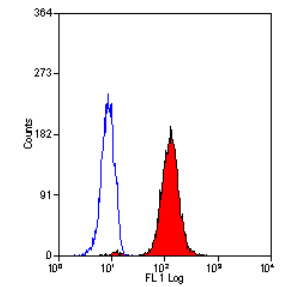Myeloperoxidase (MPO) Mouse Monoclonal Antibody [Clone ID: 2C7]
Specifications
| Product Data | |
| Clone Name | 2C7 |
| Applications | FC |
| Recommended Dilution | Flow Cytometry: Use 10 µl of Neat-1/10 diluted antibody to label 106 cells in 100 µl. Membrane permeabilisation is required for this application. |
| Reactivities | Human |
| Host | Mouse |
| Isotype | IgG1 |
| Clonality | Monoclonal |
| Immunogen | Human myeloperoxidase. Spleen cells from immunised mice were fused with cells of the mouse X63 AG8-653 myeloma cell line. |
| Specificity | This antibody recognises myeloperoxidase (MPO), an important component of azurophilic granules in neutrophils. Negative Species: Rat. |
| Formulation | PBS, pH 7.4 Label: FITC State: Liquid purified IgG fraction Stabilizer: 1% BSA Preservative: 0.09% Sodium Azide Label: Fluorescein Isothiocyanate Isomer 1 |
| Concentration | lot specific |
| Purification | Affinity Chromatography on Protein G |
| Conjugation | FITC |
| Storage | Store undiluted at 2-8°C for one month or (in aliquots) at -20°C for longer. This product is photosensitive and should be protected from light. Avoid repeated freezing and thawing. |
| Stability | Shelf life: one year from despatch. |
| Gene Name | myeloperoxidase |
| Database Link | |
| Background | Human myeloperoxidase (MPO) is a dimeric protein composed of two heavy subunits (53 kDa) and two light subunits (15 kDa). Each MPO molecule contains two prosthetic porphyrins which play an important role in the catalytic cycle. Molecular weights for MPO isoforms from pools of normal human samples range from 114,000 to 140,000 daltons reflecting a heterogeneous mixture of isoforms when assayed under non-reducing conditions of SDS-PAGE. Often MPO from a single donor will yield a homogenous preparation reflecting a single isoform. The carbohydrate component of MPO, consisting of mannose, glucose and N-acetylglucosamine residues is 2.5%. MPO is inhibited by azide and other compounds. MPO is stored in primary granules of neutrophils and serves as a bactericidal agent in that MPO catalyzes the production of hypochlorous acid (HOCl), a powerful oxidant. HOCl is derived from chloride ion (Cl-) and hydrogen peroxide (H2O2). In a number of inflammatory situations, MPO is released into the extracellular matrix where its measurement can be used as an indication of neutrophil activation. |
| Synonyms | MPO |
| Reference Data | |
Documents
| Product Manuals |
| FAQs |
{0} Product Review(s)
0 Product Review(s)
Submit review
Be the first one to submit a review
Product Citations
*Delivery time may vary from web posted schedule. Occasional delays may occur due to unforeseen
complexities in the preparation of your product. International customers may expect an additional 1-2 weeks
in shipping.






























































































































































































































































 Germany
Germany
 Japan
Japan
 United Kingdom
United Kingdom
 China
China



